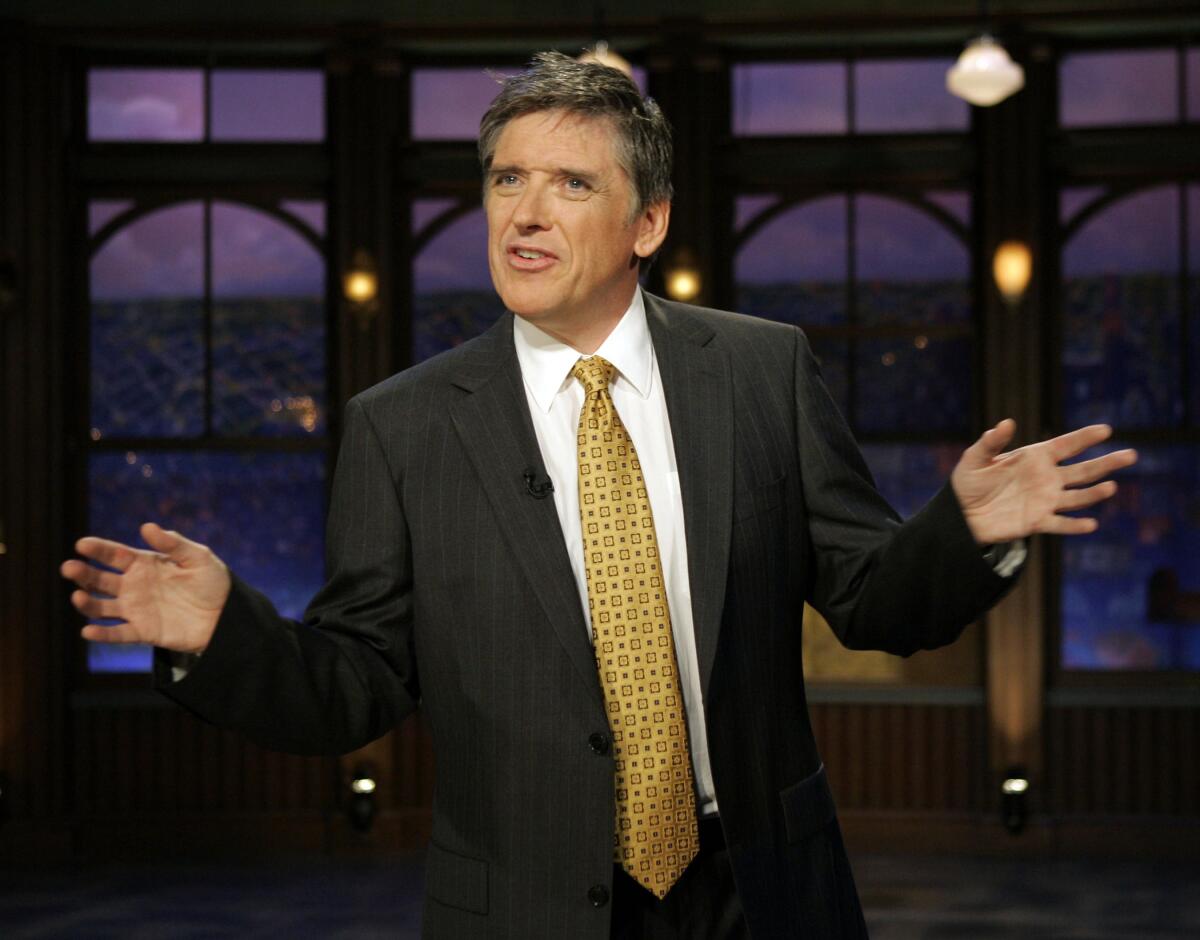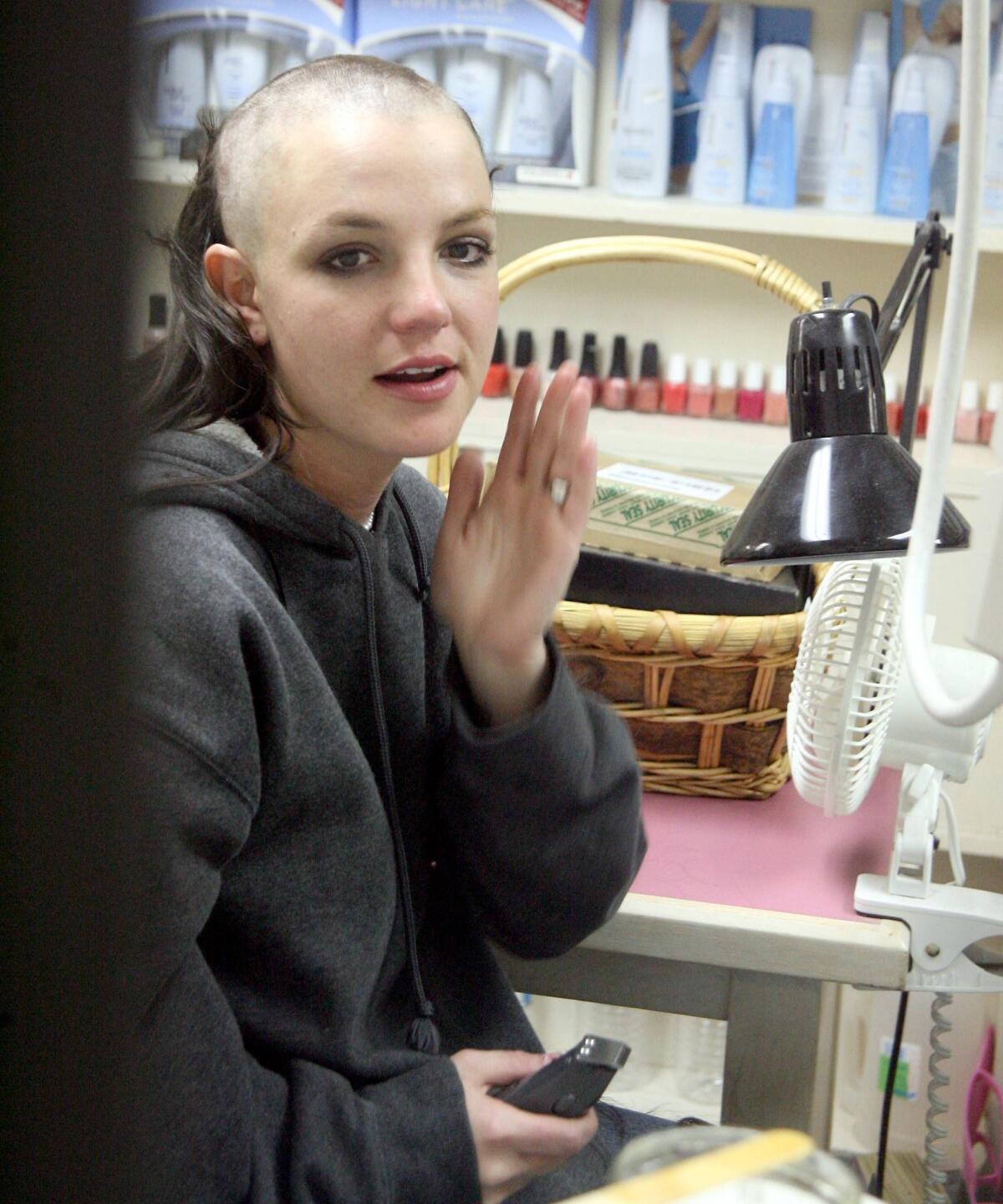Britney Spears shaved her head. Craig Ferguson’s response became late-night legend

- Share via
The introduction to this Q&A appears in the list of our 100 favorite pop culture moments of the millennium (so far).
It was Monday, Feb. 19, 2007, Presidents Day. The previous Friday, pop singer Britney Spears, in the midst of a public downward spiral, had checked herself in and out of rehab and, in front of paparazzi, shaved her head with electric clippers. That same weekend, Craig Ferguson, then host of CBS’ “The Late Late Show,” marked 15 years of sobriety. The confluence of these and other recent events convinced him that his aim “had been off a bit.”
Applying the rigor of “Frontline” to the story of her conservatorship, “Framing Britney Spears” is a pointed work of criticism aimed at celebrity culture.
Rather than mock Spears, Ferguson delivered a remarkable, seamlessly flowing 12-minute monologue — “essay” might be closer to the mark — on humor, responsibility and compassion, including a surprisingly rollicking account of his own bottoming out and rehabilitation. “This is totally a mea culpa,” Ferguson told his audience. “This is just for me.” It was news at the time, and remains vivid today. Here, speaking by phone from Glasgow, he recalls that night, and what came before and after.
That monologue made a lasting impression.
It’s funny, that particular moment. It was a thing for me too. I remember it very vividly.
I had been doing the show for a couple of years, and had been out on the road doing stand-up gigs. And I had run into Kevin Costner, of all people. I was introduced to him and he was very nice to me, but there was a weird kind of distance in his eyes. And it was only afterward I realized, “Wait a minute, I’ve been making jokes about this guy.” I can’t even remember what the jokes were about, but I’d been attacking him on TV. And I realized that he had seen this and that, you know, “Dances With Wolves” thought I was [a jerk]. He was too polite to say it, but I could tell he did. And I think what I thought was, “I’m not going to have him think I’m [a jerk] for jokes I didn’t even write, or jokes I don’t even agree with.” ’Cause that happens when you do a show every night and you have a bunch of writers, you’re bound do a joke and never think about it. Or I used to, until that point.
I happened to be away doing stand-up that weekend, and I started seeing news reports about what was happening to Britney Spears. And I remember feeling kind of shocked at the kind of glee that seemed to accompany them. I don’t know Ms. Spears and I’m not a doctor, but to all outward appearances it was some kind of psychotic episode. It didn’t look like she was having a good time at all. Now the atmosphere is very different; I don’t think that’s how it would be covered. But it was covered like that then.
When I got to work Monday, the writers were all very happy because they assumed it was a “Dick Cheney shooting his lawyer in the face” sort of event. A lawyer gets shot, nobody dies, Dick Cheney’s absolved — that’s a mine of comedy! That’s great! But I didn’t feel that way about the Britney Spears thing.
Philip McGrade and I wrote that monologue. Philip’s an old friend from Scotland; he’s known me for a long time and was one of the first hires I made on the show. Most of it really, I just kind of said, but we [assembled] the bullet points I wanted to make sure I got across. But really, I thought at the time that I was giving my resignation monologue. I thought, “They’re going to fire me for this.” And actually the opposite happened, and everyone seemed to be very happy about it. I never heard anything negative from anybody at the network or [production company] Worldwide Pants. But I was convinced at the time that I was getting into trouble.
I think at that point I started to take ownership of the show. In a weird way, it liberated me from doing the show how I initially thought it should be done, which was the way it had been done before. And it let the audience know a little bit more about what I thought about things. And I think that the show as it became was born from that moment. Up until then, I wasn’t really sure what I was doing.

You say your aim had been off, which is an unusual confession from a TV host.
I think that’s right. I think my aim had been off. When you’re early in your career — anybody who’s early in any job — you make mistakes. I was starting out as a late-night host and I was trying to make it sound like I was a late-night host. I mean, I wasn’t, and I ended up saying to anyone who would listen, what that show became was what happens when you give someone who doesn’t want to be a late-night host the job of late-night host. But initially, I was trying to fit in, to make myself some kind of snarky wise-ass. And although I’m not above that, I didn’t want to spend my life doing that. I really tried after that monologue to follow a certain kind of manifesto for myself. I remember a bunch of times when people were in trouble: “No, we’re not going to touch that.” There’s always another joke. There’s always something else to do.
Can you recall the feeling in the room?
I remember the audience were a little uncomfortable. When I mentioned Britney’s name they kind of laughed, because everyone had seen the news, and I think they expected me to do what my job was, which was to make fun of the news. And I thought, “Keep going.” But as I say, my overwhelming sensation at the time was, “They’re going to can me after this. This is not what they hired me to do.” But I thought, “It doesn’t matter, something will turn up.” I felt like I was doing the right thing.
I wanted to put myself in the position of what Ms. Spears had been in that weekend, [to show] that I understood, that I identified with her discomfort. And I because I had done that, other people identified with me too. It feels odd to talk about, because I don’t want to aggrandize myself. I didn’t mean to do it. It just felt right at the time. But it has definitely stuck. Once every couple of weeks somebody says something to me about it, still. How long ago was it, 12 years? It’s a long time.
The next day I walked into the office and somebody said, “You’re all over the news this morning,” and I thought, “What have I done?” And then I got a lot of calls from people in Hollywood who were very nice about it, people I didn’t know a lot of times, famous people, people I’d never met, who were complimentary and supportive. It felt like a bit of a validation. I also didn’t think I was picking a fight; I wasn’t trying to make anyone else feel bad about what they were doing — I didn’t want to feel bad about what I was doing.
There’s a moment at the end that feels like a purposeful address to people who might be in trouble.
I think if you have the opportunity, if it’s your turn to say something, then you should probably say it. Very rarely do I think I actually have to speak up about anything. But that time, I just felt, “This feels very personal to me.” I think because of the timing of it as well, I was 15 years sober that weekend, that was a very big part of it. You become very reflective [on an anniversary]. If there’s a 5 or a 0 in it, it feels even more important.
I also think I was lucky in a certain way, because I’d been doing late night long enough that the idea of famous people being somehow privileged or immune or different had been demystified. Eventually that happens to anyone who works in show business long enough. You meet enough people, you go, “Well, some famous people are [jerks], some people are nice and some people are forgettable” — just like everyone else. So I didn’t feel any distance from the subject matter. It just looked like a person in distress.
You hear former late-night hosts sometimes say, when times get crazy, that they miss the platform, the opportunity to comment. Do you ever think that, or is it a relief not to have to deal with the political world?
Unfortunately, I don’t think I’ve been able to feel the relief of not thinking about the political world. I’m glad I moved out before 2016. It seems like the 2016 election is what kicked off the fiery business of everything being political, and I don’t know how I would have handled it, to be honest — if I would have thrown myself into it with gusto or completely ignored it. Either stance would have been seen as political; trying to be apolitical would probably be seen as taking a stand. I’m glad I’m not doing the show for any number of reasons, but having to be a part of the noise every day, I don’t think I would like that.
Craig Ferguson has a new limited series, “Hobo Fabulous,” available on demand from the Comedy Dynamics Network, via iTunes, Amazon Prime Video, Google Play and other platforms.
More to Read
The complete guide to home viewing
Get Screen Gab for everything about the TV shows and streaming movies everyone’s talking about.
You may occasionally receive promotional content from the Los Angeles Times.







